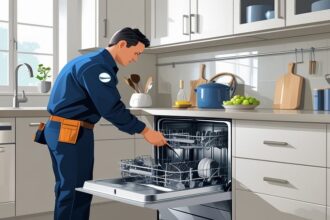In a world increasingly reliant on home appliances, the demand for skilled professionals capable of maintaining and repairing these essential machines is growing at an impressive rate. Whether it’s a refrigerator, dishwasher, washing machine, or microwave, when these devices break down, people need fast, reliable solutions. This makes appliance repair training a smart, future-proof career investment for those looking to enter a high-demand trade with strong earning potential and job stability.
- 1. High Demand and Job Security
- 2. Low Barrier to Entry
- 3. Lucrative Earning Potential
- Core Areas Covered in Training:
- 1. Trade Schools and Technical Colleges
- 2. Online Training Programs
- 3. Apprenticeships
- 4. Manufacturer Certification Programs
- Technical Skills
- Physical Skills
- Soft Skills
- Common Certifications:
- 1. Work for an Appliance Repair Company
- 2. Self-Employment
- 3. Specialization
- 1. Keeping Up with Technology
- 2. Unpredictable Work Conditions
- 3. Customer Expectations
This article explores the world of appliance repair—what it is, why it’s in demand, what training entails, and how you can begin your journey toward becoming a certified, professional appliance technician.
Why Choose Appliance Repair as a Career?
Appliance repair offers a practical, hands-on career path with several compelling advantages:
1. High Demand and Job Security
Every home and business depends on appliances. From refrigerators to air conditioners, these machines are integral to daily life. When they break, repairs are not optional—they’re urgent. This ongoing need translates into job security, especially as older, more experienced technicians retire and newer smart appliances increase the complexity of repairs.
2. Low Barrier to Entry
Unlike many other skilled trades or technical jobs, appliance repair does not require a four-year degree. Many technicians begin their careers through certifications, apprenticeships, or focused trade programs. Some even start as assistants, learning on the job and progressing with experience and licensing.
3. Lucrative Earning Potential
Appliance repair technicians typically earn a solid income. While salaries vary depending on region and specialization, experienced professionals or those who operate their own businesses can make $50,000–$80,000 annually or more. Some specialize in high-end or commercial appliances, which can increase their rates substantially.
What Is Appliance Repair Training?
Appliance repair training refers to the education and skill development required to diagnose, maintain, and repair major and minor household appliances. This training equips technicians with knowledge of mechanical, electrical, and digital systems, preparing them for work in homes, commercial settings, or with service providers.
Most programs include a combination of classroom instruction, hands-on lab experience, and sometimes field apprenticeships.
Core Areas Covered in Training:
- Electricity & Wiring Fundamentals
- Understanding volts, amps, circuits, and wiring diagrams.
- How electrical systems affect appliance performance.
- Refrigeration and Cooling Systems
- Training on refrigerators, freezers, and air conditioners.
- Troubleshooting cooling issues, compressor problems, and sealed systems.
- Heating & Drying Systems
- Covering dryers, ovens, stoves, and water heaters.
- Heating elements, thermostats, and thermal fuses.
- Mechanical Repairs
- Fixing belts, motors, pulleys, and mechanical components.
- Hands-on experience in disassembling and rebuilding units.
- Digital and Smart Appliances
- Modern appliances often have computerized control panels.
- Training includes diagnosing software-related faults and using diagnostic tools.
- Customer Service & Safety
- Communication skills, professionalism, and safety protocols are vital.
- Students learn how to interact with clients and ensure safe repairs.
Types of Appliance Repair Programs
There are different paths into the field depending on your learning preference, budget, and time commitment. Here’s a breakdown of the most common options:
1. Trade Schools and Technical Colleges
These institutions offer structured, comprehensive programs that typically last between 6 months and 2 years. Courses may result in a diploma, certificate, or associate degree. Benefits include access to instructors, equipment, and possibly job placement assistance.
2. Online Training Programs
For those needing flexibility, online courses provide instruction via videos, downloadable manuals, and virtual support. These programs are usually self-paced and may or may not offer hands-on experience.
3. Apprenticeships
Some students choose to learn on the job under the guidance of an experienced technician. This real-world experience is invaluable, though it may require more time and offer less formal structure.
4. Manufacturer Certification Programs
Major appliance brands like Whirlpool, GE, and Samsung offer their own training programs for technicians. This is especially helpful for working with warranty repairs or being hired by authorized service centers.
Skills Required for Success
To become a competent appliance technician, you’ll need a combination of technical knowledge, physical ability, and interpersonal skills.
Technical Skills
- Strong understanding of electrical circuits and mechanical systems.
- Ability to read blueprints and schematics.
- Diagnostic skills using multimeters and other tools.
Physical Skills
- Comfort working with tools and lifting heavy parts.
- Good hand-eye coordination and attention to detail.
- Safe handling of electrical and gas components.
Soft Skills
- Communication: Explaining problems and solutions to customers.
- Patience: Troubleshooting can require methodical problem-solving.
- Time Management: Efficiently handling appointments and repairs.
Certification and Licensing
Depending on your state or country, appliance repair may require specific licensing, especially if working with refrigeration or gas-powered systems.
Common Certifications:
- EPA Section 608 Certification
- Required for handling refrigerants in cooling appliances.
- National Appliance Service Technician Certification (NASTeC)
- A respected industry certification validating your expertise.
- Professional Service Association (PSA) Certification
- Offers various certifications in major appliance repair fields.
- Manufacturer-Specific Certifications
- Often preferred or required if you plan to work for a specific brand.
Starting Your Career After Training
Once you’ve completed Appliance Repair Training, you have several career paths available:
1. Work for an Appliance Repair Company
Many technicians begin their careers by working for established businesses. This provides structure, steady income, and the chance to build experience.
2. Self-Employment
Starting your own repair business gives you independence and higher earning potential. However, it requires an understanding of business operations, marketing, and client relations.
3. Specialization
You may choose to specialize in a certain type of appliance or brand, such as refrigeration, commercial kitchen equipment, or high-end luxury appliances. Specialization can lead to increased demand and higher pay.
Challenges in the Field
Like any profession, appliance repair comes with its own set of challenges:
1. Keeping Up with Technology
Smart appliances are constantly evolving. Technicians must stay current with software updates, connectivity issues, and advanced diagnostic tools.
2. Unpredictable Work Conditions
You’ll work in tight spaces, crawl under units, and sometimes face urgent or emergency repairs. Adaptability is key.
3. Customer Expectations
Dealing with frustrated customers requires patience and professionalism. Clear communication and reliability are essential for building trust.
Continuing Education and Career Growth
Appliance repair is not static. As technology advances, technicians must keep learning. Many experienced professionals continue their education through advanced certifications or specialized training workshops.
You might eventually become a lead technician, supervisor, trainer, or even transition into product development or tech support roles for appliance manufacturers.
Some also move into related fields like HVAC, plumbing, or electrical work—especially if they’ve obtained foundational skills through appliance repair training.
Is Appliance Repair Right for You?
If you enjoy solving problems, working with your hands, and helping people, appliance repair could be a rewarding career. It’s particularly suited for those who:
- Prefer short, focused training instead of years in college.
- Are mechanically inclined and curious about how things work.
- I want a job that offers both independence and steady demand.
- Like the idea of entrepreneurship or owning their own business.
Final Thoughts
The modern world runs on appliances, and as long as people depend on them, there will always be a need for skilled repair technicians. With affordable, accessible appliance repair training, you can begin a career that offers stability, freedom, and the satisfaction of solving real problems every day.
Whether you’re just out of school, changing careers, or looking for a new trade, appliance repair provides an excellent opportunity to build a valuable, in-demand skillset with lasting potential.

















